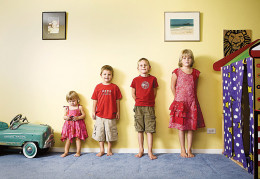Regarding birth order relationships, why are oldest siblings the giving, more in
Regarding birth order relationships, why are oldest siblings the giving, more independent,
conscientious, & responsible; middle siblings floating in & out, being the familial chameleon; & the youngest being the most selfish, happiest, freest, & most irresponsible of all? Why in the sibling relationship, the oldest is one who is ALWAYS GIVING while the younger siblings are ALWAYS TAKING? Give specific answers please.
You make a lot of unproven assertions here, Grace. Methinks you might be an eldest child waiting to be told a few nice things about yourself. Perhaps not. In any case, I'll say what I think based on my own observations of my three grown up children and four grandchildren, the eldest grandchild who is already twenty-seven.
When a couple have children they are like 'learner drivers' who haven't been shown how to drive. Consequently they are more prone to making mistakes with their first born. They could be too strict, or too easy going. They might be over critical and expect too much of a child. So the elder child usually cops a lot of flack, especially from Dad.
By the time the second child comes along they've learned a lot but are still far from all-knowing. The second child is likely to be given somewhat wiser guidance. And the elder child often takes on the responsibility of looking after the younger ones - hence the older child grows up more quickly, and hence your observation of being more independent.
By the time the third child arrives the parents are far more lay back. They know what to expect and what is expected of them. Often the youngest tends to be spoiled, as the parents go from being too strict to going the opposite way regarding the youngest child's welfare. I know when I was young (I had two brothers and two sisters) I felt the youngest, a girl, was favoured and spoiled by my father. But I didn't resent it that much.
As for giving and taking, I cannot agree. In my own three children the middle one is probably the most giving. I put that down to her being a woman whilst the other two are men now. Women, as a rule - and I generalize - tend to be more giving than men.
I hope that answers your question.Oh no, not assumptions at all but facts, oldest children always have to BE THE ONE, middle children are well....while the youngest is the spoilt one. I have seen this in my mother's family. She's the oldest of 10. No, I am not the oldest at all.
"The Birth Order Book" will answer many of your questions. It is a fascinating read that will help you understand not only your place in your family, but also your spouses' and your children's.
Basically it says first born are pleasers; middle are gregarious; third born are peacemakers. It also explains the dynamic when there are more or less than three children in a family.I read that book, excellent book by the way. I also read most of Dr. Kevin Leman's birth order books. I have repeatedly observed from my mother & other oldest children how they give, give while the younger siblings take & DON'T do a thing.
The oldest is perceived as always giving while the younger are always taking, because parents expect the oldest to be more understanding of the younger children's needs and wants. The oldest is the only one who gets to experience being the only child before having siblings. The type of bond is often different. So expectations are higher. They are not only older, but considered to be more responsible, because logically the older a child is the more they know.
Middle children have to compete with the first child who often is the trial and error child who gets to do things the others don't (because the parent uses the first child to figure out how to parent). The second born child gets to do less than the first child, so they end up feeling left out or feeling things are unfair, especially once the oldest reaches an age where they no longer just want to be around their siblings. I've noticed the result of this is often the middle child having more of a bond with the youngest sibling over the oldest even though the oldest probably spent more time with them.
The "baby" of the family gets to be more selfish and "happiest" because by the time the parent gets to that child they have learned what works and what doesn't. It is the last chance for the parent to get it right so they treat the baby like a literal baby for too long usually. The result is the baby becomes the brat of the family.
I am married to a middle child of 3, my ex husband was a middle of 4, and I have 3 children. It seems to be that the order of children leads to very predictable behavior. The results really just come from the parents learning as they go. I grew up an only child and parenting did not come with a step by step guide. So you learn with the first, learn more with the second, and by the time you get to the third it becomes more about just making the child happy instead of learning how to do anything the right way.
I should add, thanks to you posting these types of questions since you have been here, I have become more aware of my own parenting to help curb how I may treat my children unfairly. I am determined to stop middle child syndrome!You're quite welcome indeed. I have read on and studied birth order personally. Kevin Leman has many good books on birth order.
Using the word 'always' is a stretch. It's possible that this layout is more common, but it's certainly not the rule. I'm the youngest of three boys and yet I've accepted the least amount of money from my parents. (It requires extreme circumstances for me to ask). And, the middle child is the most responsible and successful. One of my brother's wives was one of two (the younger) and she is successful while her older sibling is in jail. And my wife is the youngest of four and she has the highest level of education, moved the farthest away, and clawed her way up the ladder to a full time position at a nationally recognized company. So, from my personal experiences, the sibling factor isn't a guarantee of anything in their future.
The first child is the "practice child". Parents "learn on them".
Most new parents apply everything they've heard and read about raising children on that first child. In some situations the oldest child is held responsible for looking out for their siblings lit a lieutenant in the military obeying orders from their captains (the parents).
When parents want a "date night" they leave the oldest "in charge".
Anytime something goes wrong they're told: "You should know better!" As if wisdom is imparted according to birth order and not life experience.
By the same token being the "first' you're likely to have more childhood photos taken of you than your siblings, there are no "hand me downs", you're encouraged to demonstrate advancement for your age by talking, walking, and reading sooner than other children. Everyone wants to shower you with love and affection (until) your parents have another child.
Some older children adapt well to becoming the older protective brother or sister and some ponder ideas for eliminating the competition.
The middle child has the experience of once being "the baby" or youngest until they got "demoted" when another child joined the family. So now they're not given the respect and responsibility or expected to achieve as much as the oldest child and they're not being pampered like the youngest child. Oftentimes the youngest child will look up to the oldest child and not have respect for the older middle sibling especially if they're close in age.
The biggest difference for why children are treated differently is because parents like anyone else change and evolve over the years.
A 34 year old mother is not going to "sweat the small things" as much as she did when she was a 26 year old mother. In fact she may have reached the realization that children grow up too quickly!
She now wants to hold onto all those moments when children love being with their parents instead of being embarrassed to be seen with them. Therefore she's in no hurry to cut the apron strings.
Therefore she's in no hurry to cut the apron strings.
The thought of having an "empty nest" also scares a lot of parents!I've heard that a lot!

There's something about knowing time is flying by and it won't be long before your last child, your "baby" will want to distance them self from their parents. This keeps many parents from forcing independence on them.
Related Discussions
- 50
Birth Order: What's Good or Bad About Yours?
by Lisa HW 5 years ago
My theory is that most people seem to like whatever place they've ended up with among their siblings. Most also do seem to have a few minor gripes about it. Without considering anything you've ever read in books about birth order, what's your own personal take on your own place in the...
- 14
Which birth order is the unhappiest and why?
by Grace Marguerite Williams 12 years ago
Which birth order is the unhappiest and why?
- 21
What is the happiest and luckiest birth order imaginable?
by Grace Marguerite Williams 13 years ago
What is the happiest and luckiest birth order imaginable?
- 13
Do you think an only child is better off more than they are with siblings?
by jagandelight 7 years ago
Do you think an only child is better off more than they are with siblings?
- 16
Would you rather be the oldest child, in the middle, or the youngest?
by nanderson500 5 years ago
Would you rather be the oldest child, in the middle, or the youngest?
- 15
Do you think that your sibling position effects your confidence and approach to
by Tom Radford 12 years ago
Do you think that your sibling position effects your confidence and approach to others?I'm the youngest of five. As a child my opinon was seldom heard or listened to. I grew up feeling like a nuisance and would be loud and outrageous to mask it. My partner is the oldest of three, she is wracked by...











